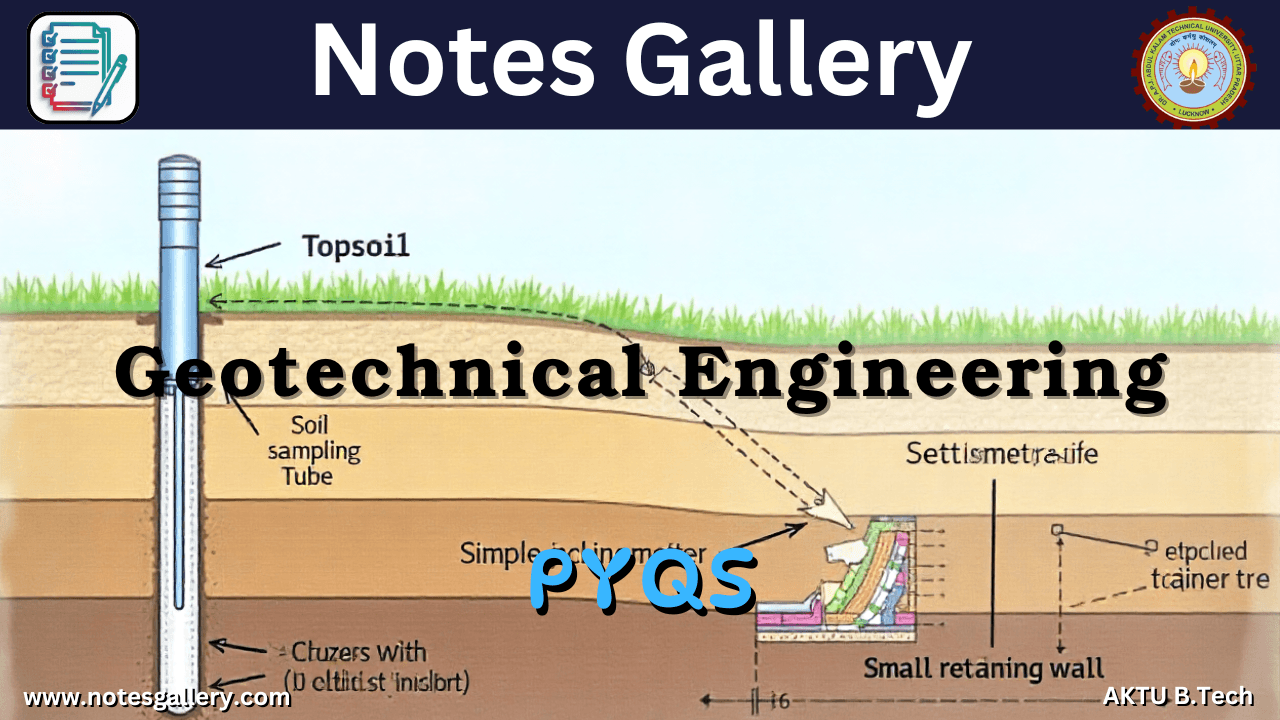Preparing for Civil 3rd Year AKTU PYQS (Geotechnical Engineering) can feel overwhelming, especially when the subject covers complex topics like soil behaviour, bearing capacity, and slope stability. But with the right strategy and focused preparation, it becomes one of the most scoring subjects of the semester. Previous year questions hold a major role in understanding exam patterns, important topics, and the style of questions AKTU sets. That is why students rely heavily on Civil 3rd Year AKTU PYQS (Geotechnical Engineering) to improve their accuracy and confidence before exams.
| YEAR | LINKS |
|---|---|
| 2017-18 | DOWNLOAD |
| 2018-19 | DOWNLOAD |
| 2019-20 | DOWNLOAD |
| 2020-21 | DOWNLOAD |
| 2021-22 | DOWNLOAD |
| 2022-23 | DOWNLOAD |
| 2023-24 | DOWNLOAD |
| 2024-25 | DOWNLOAD |
| 2025-26 | coming soon… |
Click Links given below for notes/Imp. Question/PYQs
https://notesgallery.com/aktu-b-tech-1st-year-free-study-materials/ First Year
https://notesgallery.com/aktu-b-tech-2nd-year-free-study-materials/ Second Year
https://notesgallery.com/aktu-b-tech-3rd-year-free-study-materials/ Third Year
https://notesgallery.com/aktu-b-tech-4th-year-free-study-materials/ Fourth Year
Importance of Geotechnical Engineering in Civil Engineering
Geotechnical Engineering is one of the core branches of Civil Engineering. It deals with the study of soil, rock, foundations, and underground structures. In practical fieldwork, engineers use geotechnical principles to design stable foundations for buildings, bridges, dams, highways, and retaining walls. This subject builds the foundation of knowledge for your future internships and placements. While preparing from textbooks is important, analyzing Civil 3rd Year AKTU PYQS (Geotechnical Engineering) helps you understand real exam expectations and common question patterns.
Why PYQs Are Essential for Exam Preparation
AKTU exams frequently repeat concepts, numerical types, and theoretical questions from previous years. Students who study PYQs can identify which units are most scoring and which topics require deeper understanding. For example, soil classification, permeability, consolidation, compaction, shear strength, and bearing capacity are some of the most repeatedly asked areas. Solving Civil 3rd Year AKTU PYQS (Geotechnical Engineering) not only improves memory retention but also enhances your ability to solve numerical problems under time pressure.
Key Topics Covered in Geotechnical Engineering PYQs
To make your preparation more structured, here are the topics that appear regularly in AKTU question papers:
Soil Index Properties
These include Atterberg limits, specific gravity, water content, density, and soil classification. PYQs often include short notes and numerical questions related to these properties.
Permeability and Seepage
Questions on Darcy’s law, laboratory tests, and flow nets are frequently repeated. PYQs help you understand the numerical patterns and variations in seepage analysis.
Compaction and Consolidation
These units carry heavy numerical weightage. Most Civil 3rd Year AKTU PYQS (Geotechnical Engineering) contain calculation-based questions from consolidation settlement and compaction curves.
Shear Strength of Soil
Mohr-Coulomb failure theory, direct shear test, and triaxial test remain among the most important and commonly asked topics. PYQs show how theory and numericals are usually mixed in the exam.
Bearing Capacity and Foundation Design
Foundation engineering questions appear every year. PYQs help you understand commonly asked formulas and problem-solving methods.
How to Study Effectively Using PYQs
Start by categorizing PYQs unit-wise. Then, identify which questions repeat frequently. Solve all important numericals at least twice before the exam. Combine PYQs with class notes and standard books like Braja M. Das to strengthen concepts. Always practice numericals with step-by-step solutions to avoid silly mistakes. The more you practice Civil 3rd Year AKTU PYQS (Geotechnical Engineering), the more confident you become in attempting long and numerical questions accurately.
Final Tips for Scoring High
Stay consistent with your study routine, revise formulas daily, and focus more on repeated areas. Most students score well when they balance PYQ practice with conceptual clarity. Geotechnical Engineering may seem tough at first, but with dedicated practice using Civil 3rd Year AKTU PYQS (Geotechnical Engineering), you can easily score higher marks in your AKTU semester exams.
To further improve your preparation strategy, make sure you attempt a few mock tests after solving all important PYQs. This gives you a clear idea of your accuracy, speed, and readiness for the final exam. Many toppers say that solving Civil 3rd Year AKTU PYQS (Geotechnical Engineering) repeatedly is the easiest way to reduce exam fear and improve confidence. Maintain a separate notebook for formulas, diagrams, and important numericals. Revising this notebook in the last week before the exam significantly boosts your retention and helps you attempt even tricky questions with clarity and precision.
